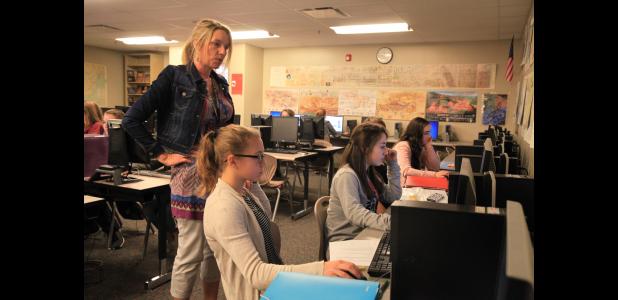Tracking growth, not grades
Chris Rourke
Times Staff Writer
The line of parents outside Robin Wilkinson's freshman social studies classroom at Gunnison High School (GHS) was surprisingly long during parent-teacher conference night. Parents were anxious to learn about Wilkinson's new grading method and how their children were performing.
Wilkinson — long frustrated with how letter grades influence student performance — put years of research into action this year.
Her aim is to show growth over the course of a year while promoting authentic learning — not just memorization of facts in an effort to score a grade.
She approached school administrators about implementing a new way to evaluate students. Instead of grading each assignment turned in by students in a traditional manner, she proposed giving them one of four unique terms: emerging, progressing, partial mastery and mastery. Administrators agreed to the approach.
"I always appreciate when a teacher is willing to try something new because they believe the feedback or process they are trying will have a larger impact on student learning," said GHS Principal Andy Hanks. "Sometimes trying something new in the educational system is scary, but oftentimes it is the risk-taking of trying something new that teaches us how to grow and get better.”
Student progress is uploaded to a website called "Fresh Grade," where both students and their parents can monitor the work performed and feedback from the teacher.
Students may resubmit projects in an effort to achieve a higher level — hopefully mastery of the topic. Students may also alter their projects based on what they want to learn — as long as they consult with Wilkinson beforehand.
Students, she explained, have felt security — and even identity — in earning letter grades. Now they are learning to trust her — and themselves — to achieve their learning goals.
"Grades have incorrectly labeled students," Wilkinson explained. "This is an opportunity for them to grow and take educational risks."
Currently, students are studying East Asia and demonstrating their knowledge of the area by producing a tourism slideshow. Wilkinson has already seen students once unsure about the process seeking help, resubmitting work and taking more responsibility for their achievements.
Wilkinson is also finding that it is easier to meet the needs of a broad range of students in one classroom — from high achievers to those who struggle with school work.
The students are finding their needs are better met as well. Freshman Kathryn Guerrieri has long fit the profile of a high-achieving student, participating in advanced learning classes in both elementary and middle schools. She said she has found the new system to be less stressful.
"At first I freaked out," admitted Guerrieri. "But after I saw how it's going to work, I felt better about it. I find it's a little harder to gauge where I am, because I don't have those solid letter grades, but I think I'm doing almost as good as I would with regular grades."
Classmate Zeb Alexander said he felt that the grading system was a good fit for all levels of students.
"I like it," said Alexander. "We don't have to stress out about having a perfect grade. You can reach your own way to grow, and learn instead of being perfect."
Wilkinson will assign grades at the close of the semester, but she has assured parents that her experiment with eliminating a traditional evaluation system will not be at the expense of students. Students who implement feedback and show growth will earn higher grades, she said. Wilkinson acknowledged that grades culturally are a part of the education system, but she hopes her class will change that perspective.
"It's not about points. It's about growth," she said.
(Chris Rourke can be contacted at 970.641.1414 or at chris.rourke@gunnisontimes.com.)


